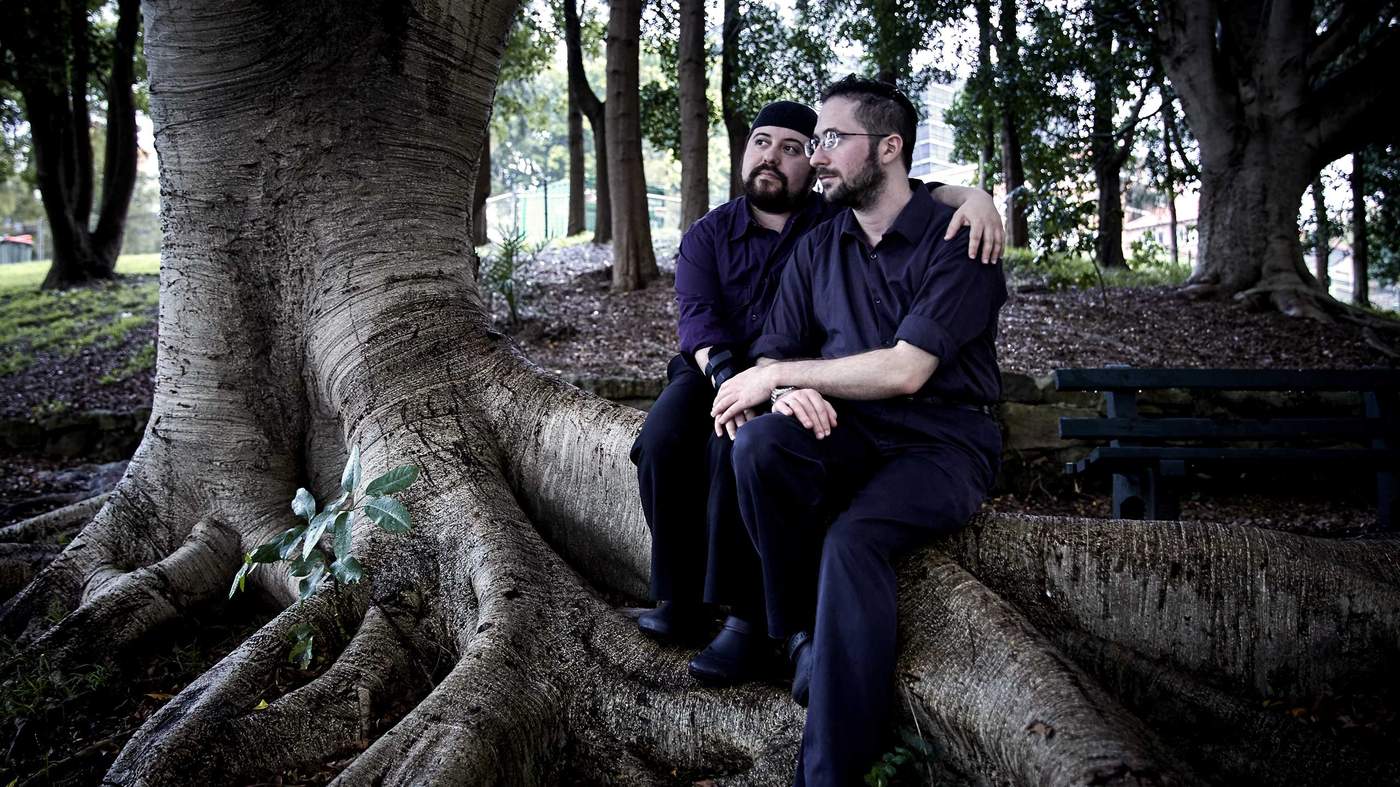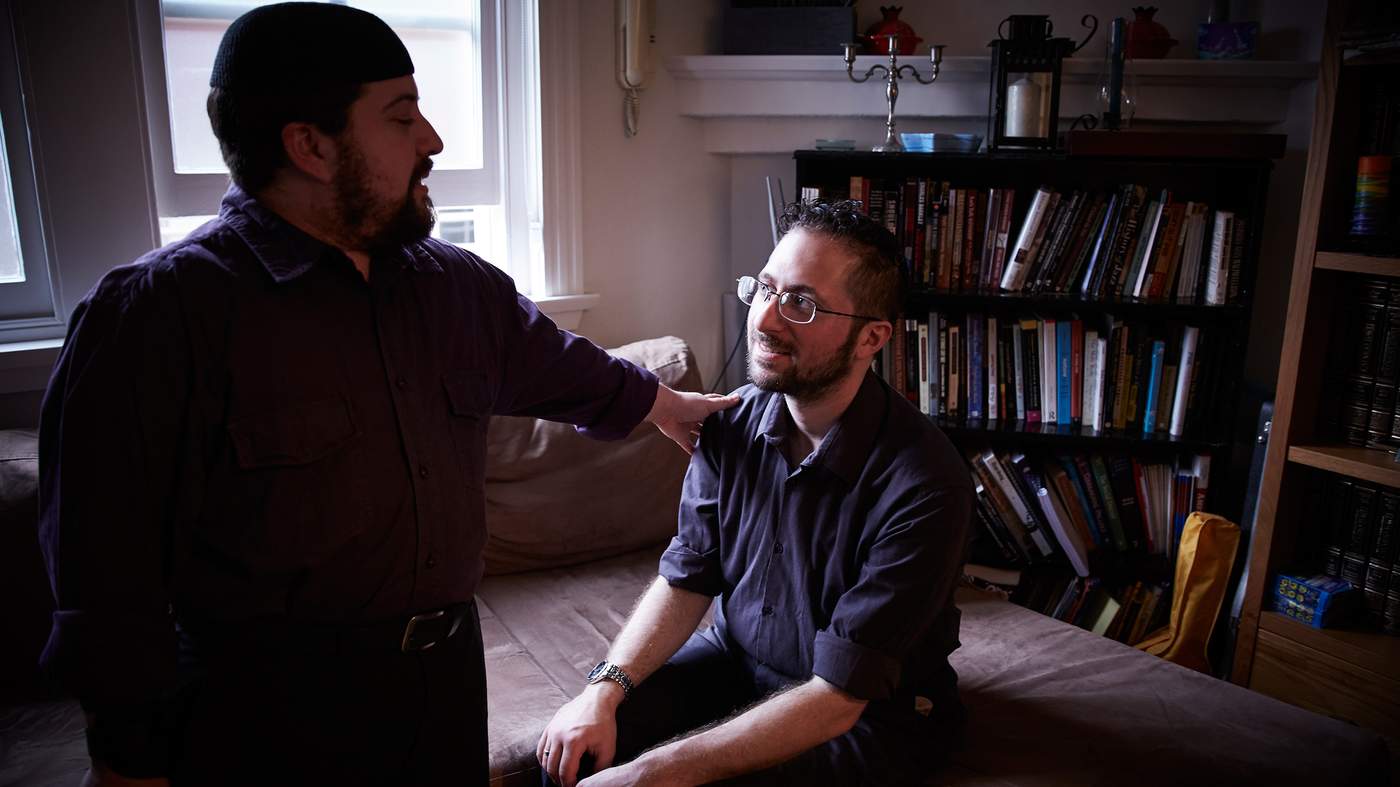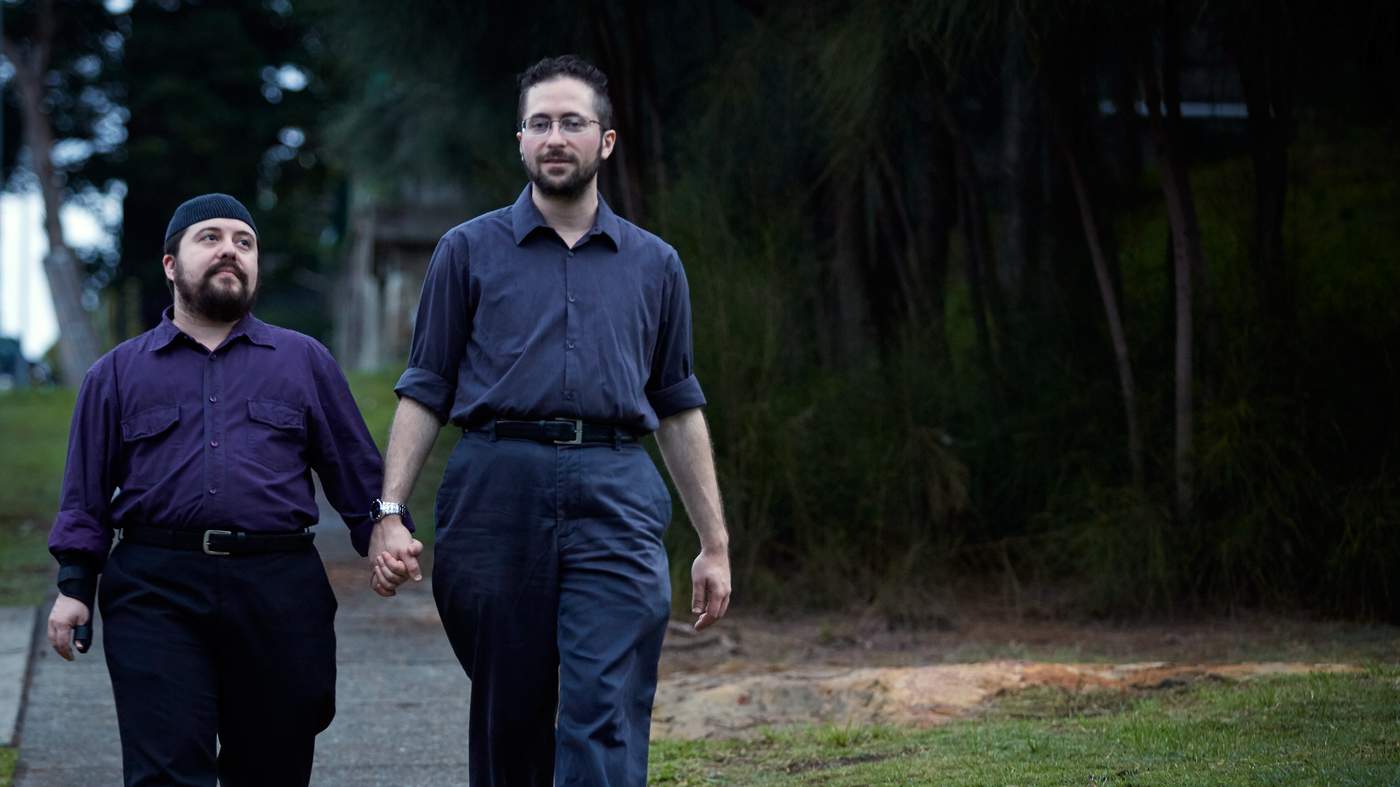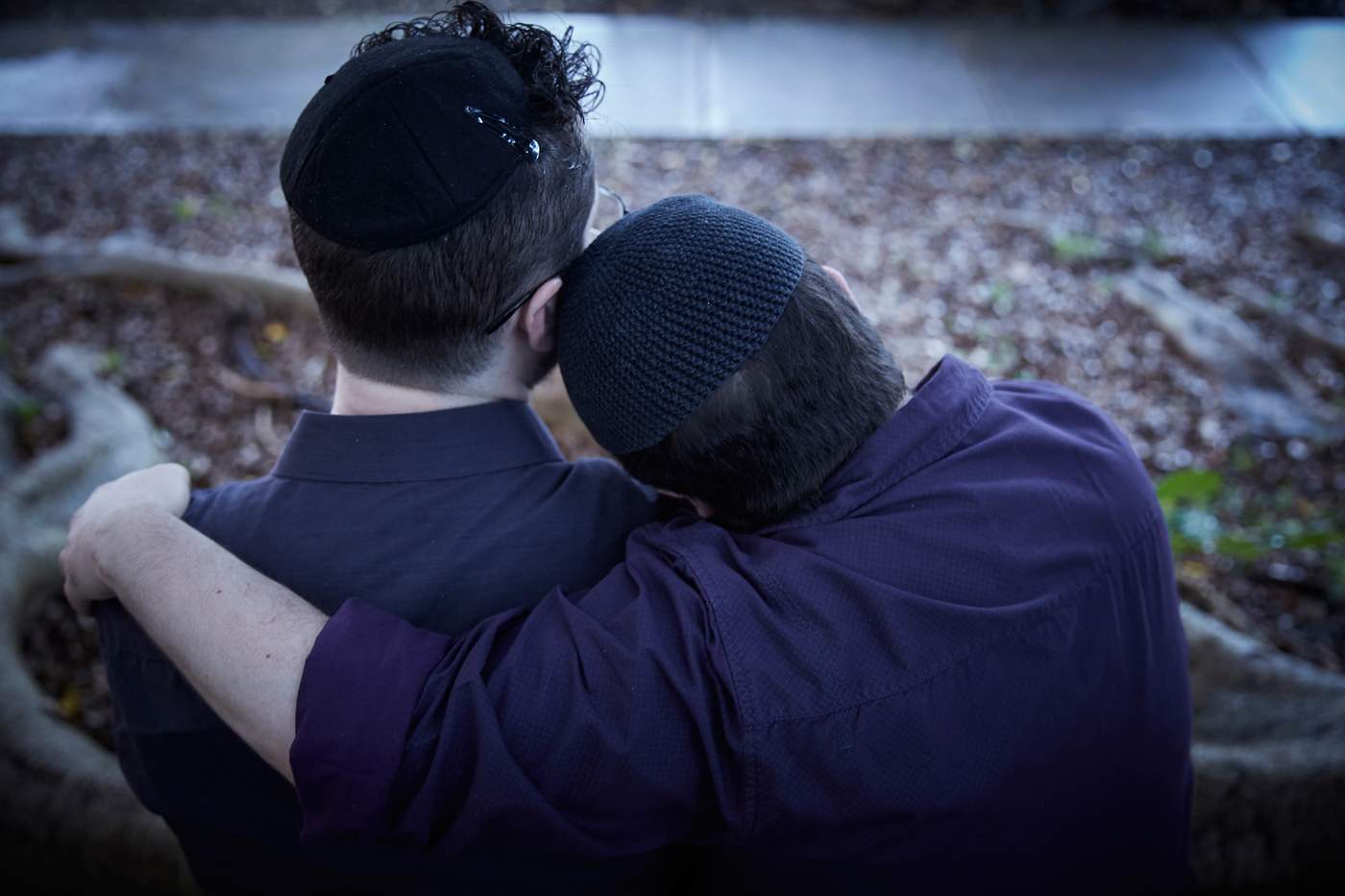
Two men, married to each other, are strict Orthodox Jews. But their religion forbids active homosexual relations. Facing intolerance from far-right Jewish leaders in the US and Israel, have they found acceptance in Australia?

Reading time: 17 minutes
Words by Ian Cuthbertson
Pictures by Nick Cubbin
23 February 2017

THEIRS IS A modest home, by any standards. The very full lives of Dr Gávi Ansara and his husband Sruli Berger, a medical student in his final year, are conducted in full observance of Jewish orthodoxy in a tiny one-bedroom flat in Sydney’s eastern suburbs.
Not one centimetre of space is wasted. A shelf near the kitchen becomes a makeshift work desk. It’s barely large enough to hold a laptop computer on which endless hours of work and study are performed. To move through the flat in the middle of the night must be like negotiating an obstacle course.
In the daytime, the accoutrements required for one task must be completely removed to perform another. But against one wall, in pride of place, stands their massive library of Jewish texts. It dominates the living room and speaks volumes about their mutual devotion to the Jewish faith. Yet the calm the two exude makes the cramped space strangely welcoming. Speaking with them on space hastily cleared on a couch, with shoes removed at the door, and with Ansara curled up in his favourite chair like a cat, the space seems to expand around us. In minutes I feel like a welcome and trusted friend. Even when the photographer arrives with what looks like a cello case full of lenses and lights, the air of welcome continues.
“We don’t really like the flat,” says Ansara. “We just need to be within walking distance of a synagogue.”
But if a house is not a home, as Hal David, the son of Jewish Austrian immigrants famously wrote in a lyric for Burt Bacharach, a smallish flat certainly can be.
“People often talk about sacred space,” says Ansara. “In a lot of religions the focus is very much on houses of worship. In Jewish tradition it was always the home. There are so many religious rituals that don’t happen in the synagogue. There’s a prayer to say after you go to the bathroom – so you’re thanking god for a body that allows you to excrete things. There’s a special blessing to say when you see a natural wonder, when you see a rainbow, when you see the ocean for the first time.”

When he was around 10 or 11, he found a secular magazine with an article titled ‘It’s OK to be Gay!’ in a doctor’s waiting room.

Then, of course, there’s observance of Shabbat, a bit like resting on the Sabbath in the Christian tradition, but with far more proscription of what individuals can and can’t do, and for many Jews, with far greater depth of meaning. Jewish philosopher Abraham Joshua Heschel declared Shabbat a sacred island in time, and wrote: “The Jewish contribution to the idea of love is the conception of love of the Sabbath, the love of a day, of spirit in the form of time.” More practically it means, among other things, the temporary cessation of weekday activities, and of the use of computers and mobile devices.
“It’s liberating,” says Ansara. “It’s a really wonderful time when, no matter how stressed out you are, no matter how much work you have to do, you just stop – that’s all you can do for now, put it aside, put it out of your mind.”
To the non-religious, this ritualised life might seem constrained, stultifying. “I don’t find it oppressive, I find it beautiful,” Ansara says. “For example, when somebody dies we have a tradition that is deeply sensitive to human psychology. Mourners tear their clothing; for the first seven days of mourning, other people bring you food. We go to mourners’ houses to make prayer services. So there are things that happen in the first seven days, in the first 30 days, and by the end of a year long period you’ve actually worked through the cycle of your grief through these different religious stages.”
Ansara says there are a lot of ways in which his vocational background – he holds a doctorate in psychology – has helped him appreciate certain aspects of the tradition that he might not have considered so deeply before. “It’s not designed to control, it’s giving you an opportunity to connect,” he says. “What you do with that opportunity is up to you.”

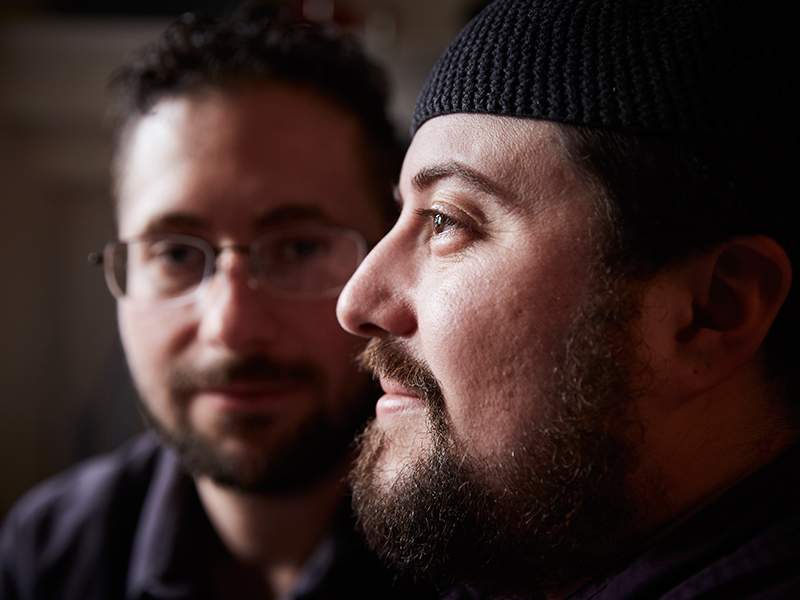
L-R: Sruli Berger and Gávi Ansara.

Apart from his doctorate, Ansara has an MSc in social psychology and a BA in international and cross-cultural health. He is recognised globally for research, lecturing, health policy work, and involvement in international human rights and social justice efforts. He has also won various scholarships and awards, including being the 2012 recipient of the American Psychological Association’s Division 44 Transgender Research Award for his original and significant research contributions to the field.
Then there’s his private psychotherapy practice and working internationally as a consultant in fields as diverse as asylum and refugees, bereavement, discrimination, gender affirmation, sexual health, therapeutic advocacy and trauma. Right now, he is in the middle of postgraduate studies in endocrinology.
“That’s only because I wanted to work with people who have endocrine issues,” he says. “You actually need to understand a bit of the medical side of it to be able to provide the appropriate psychosocial services.”
He may be something of an intellectual overachiever, but closest to Ansara’s heart is his marriage to Berger and his faith as an observant orthodox Jew. So how did two good Jewish boys come to fall in love first with their faith and then with each other? It’s a long story; a story that began well before they met 13 years ago in the USA.
Ansara grew up in several strictly observant Orthodox communities where many people did not have television. When he was around 10 or 11, he found a secular magazine with an article titled It’s OK to be Gay! in a doctor’s waiting room. “I pretended to be looking at another article,” he says. The receptionist told him he could keep the magazine. “I recall having the magazine under my bed and glancing at it for comfort multiple times, but I still could not have said then how the article related to my own life or why it brought such great relief,” he says.

“The whole world is a very narrow bridge, but the main thing is not to be afraid at all.”

Later, when faced with the decision to risk building his life with another man and potentially losing his ability to belong in the Orthodox community, Ansara prayed to Hashem (God) for guidance. “I agonised over my decision. It was during the High Holidays – the annual Rosh Hashanah and Yom Kippur period – when I engaged in a traditional religious form of seeking spiritual guidance through dreams,” he says.
“In my dream, I saw a steep and high set of stairs, a bridge up from the depths to the heavens. The stairs seemed so numerous and the height so high that it felt impossible to climb. Just when I thought that the journey would be impossible, a great rabbi with extreme modesty and tenderness appeared in my dream and took each of my hands in his own. He danced a traditional dance with me while singing a Hebrew song. The English translation would be: ‘The whole world is a very narrow bridge, but the main thing is not to be afraid at all’.”
Ansara says he asked his rabbi at the time who this man could be. “The rabbi explained that this was Rebbe Nachman, the Breslov Rebbe, who had visited me in my dream. It was his song and his message telling me to go ahead and stay on the path. Since that time, whenever I have a disheartening experience with discrimination, I remember Rebbe Nachman's words and remember that Hashem has made a path for me, no matter how narrow the bridge may seem.”
Berger’s upbringing was less orthodox. “My family is fairly secular, more spiritual than religious,” he says. “My mother always lights her Shabbat candles, but she has her own personal relationship with God rather than a focus on mitzvot or identity.”

“The external pressures, both financial and social, led to us breaking up for a period, but we later renewed our commitment and got married.”

Berger says he became observant as a teenager, years before meeting Ansara. “I have made my own way in the Jewish community. I think who you disclose things to depends on the situation and how you expect them to react. Everybody is different, and you can’t necessarily go by assumptions based on the movement to which they belong. Sometimes the more Charedi people are more open-minded than the ‘modern’ people, because they’re thinking on a completely different level and don’t care what others think.
“People like to think that it’s a Progressive vs. Orthodox situation, that everything fits neatly into some left-wing/right-wing box. But we have friends at Progressive synagogues who experience discrimination. Some Progressive congregations are the most homophobic and transphobic and some Orthodox congregations are completely welcoming, and pre-emptively so.”
When they met, Berger was attracted to Ansara’s passion for Torah and his joy in living. And though they are now more comfortable, there is a real sense that he misses the hungry years.
“The early days were good in that we had each other through very difficult times, living in slums and hiding our relationship from the Charedi community in which we lived,” he says. “The external pressures, both financial and social, led to us breaking up for a period, but we later renewed our commitment and got married.”
While living together in England and enrolled in psychology doctorates at UK universities, the men travelled overseas to coastal New Hampshire for a civil marriage, in a state park overlooking the Atlantic Ocean, shortly after same-gender marriage was legalised in the state. As part of a religious engagement ceremony called Tennaim, they held a civil marriage on a scenic lookout at the end of a tree-lined former road with stone walls on either side, reminiscent of the narrow bridge from Gávi’s dream. The wedding ceremony followed a year later, attended by 50 friends and well-wishers.


YOU MIGHT THINK that Jewish people, especially Jewish leaders, would be well aware of how it feels to be persecuted and judged, discriminated against and bullied. While most of the Australian Jewish leaders contacted for this story offered hope and at least a conditional welcome for LGBTI people, the far right, especially in America, persists.
In April 2016, Rabbi Jonathan Cahn, who has been ranting since gay marriage was legalised that America is on the verge of destruction, closed the annual "Washington – A Man of Prayer" event, just as he did the previous year. Among the US members of Congress who participated were House Speaker Paul Ryan, Rep. Louie Gohmert, and Sen. James Lankford. Each delivered prayers from the podium and listened as Cahn warned: “America, founded for the purpose and glory of God, drove God out of its government, out of its culture, out of its public squares. It celebrated ungodliness and called evil good, and good evil, through legal abortion and marriage equality.”
An indication of the direction leaders in Australia are now taking was on display in October when outspoken Israeli politician and columnist Moshe Feiglin visited to drum up funding for his new party, Zehut. A dozen Jewish and Zionist organisations came together to issue a statement:
"Moshe Feiglin’s views on women, homosexuality and Palestinian citizens of Israel are inconsistent with Jewish values. They have no place in a modern democracy such as Israel that was established on the principle of respecting the human rights of all its minorities.”

“We do not engage in any sexual activity prohibited by the Torah, but there is no modest way to correct such assumptions.”

On gay rights, Feiglin, who declares himself “a proud homophobe”, has written:
"Throughout history, from Rome to Europe in our day, the approval and spread of homosexuality presaged the decline of nations and cultures. If one reads the Torah portion 'Noah' – this comes as no surprise. The organisers of a pride parade do not wish to gain rights. They strive to force homosexuality as a culture upon the public sphere. A minority has no right to take over public assets. Let the marchers kindly go back to their individual closets. And let them do it without whining, because no one interferes with their affairs in there. Let them give up their attempts at takeovers, and leave the public sphere to normal people.”
One of those opposed to the presence of Feiglin in Australia was Rabbi Benjamin Elton, chief minister of Australia’s largest Orthodox Jewish congregation, The Great Synagogue in Sydney. He comprehensively barred Feiglin from speaking at his church. “He wouldn’t be welcome here,” Elton told journalists. “I’m absolutely opposed to any sexism, racism or homophobia.”

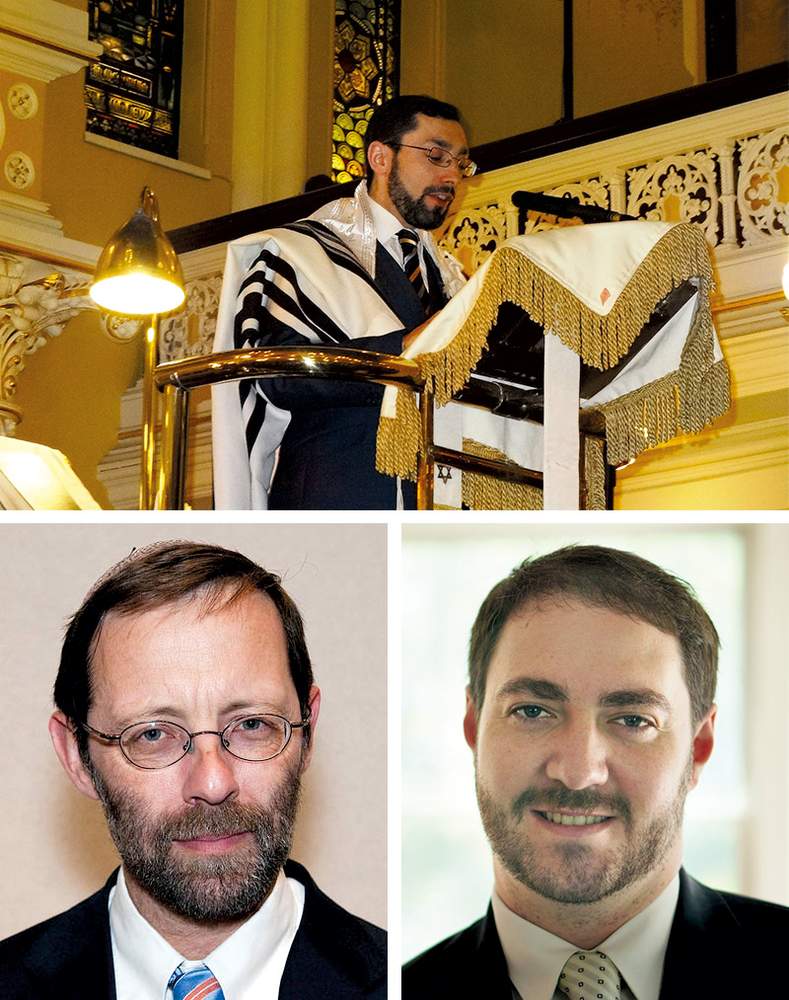
Clockwise from top: Rabbi Benjamin Elton of The Great Synagogue in Sydney (Photo: Nitza Lowenstein), Rabbi Alon Meltzer of the ACT Jewish Community (photo: LinkedIn), and Israeli politician and columnist Moshe Feiglin (photo: David Rabkin).

Speaking last year with SBS online, Elton said: “I am the rabbi of a very inclusive synagogue. One of our primary values is that everybody is welcome. [We] don’t start making judgements about people, so it really is an open door.”
Elton cites the presence in his congregation of gay people as an ongoing tradition that long preceded his time as rabbi. “I think it’s a very beautiful tradition of the Great Synagogue that the community is tolerant and welcoming and just takes people as people,” he says.
“If I’m asked directly: ‘is it permitted to have active homosexual relations?’, then the answer is no, under Jewish law. But we don’t dwell on what people do or what people don’t do – to be honest, we don’t know what people do. God knows what goes on in anybody else’s bedroom.”
This “not knowing” might be of comfort to Gávi Ansara. “One of the rules of halachah (Jewish law) is that a psak halachah (legal judgement) cannot be made about an issue related to a person's life without the Rabbanim first gaining a deep understanding of multiple dimensions of that issue and that person,” Ansara says. “In Orthodox communities, husbands and wives are restricted from having physical contact at certain times of the month. Due to the high value placed on modesty, it is rare to hear anyone speculate about another person's intimate physical activities with their spouse.
“Yet I learned from a close friend that many people do speculate about our intimacies and assume my husband and I are violating Torah law in our private sexual lives. It is unfortunate and deeply immodest that otherwise modest people would bring their fantasies into my private life. We do not engage in any sexual activity prohibited by the Torah, but there is no modest way to correct such assumptions.”


LIKE BENJAMIN ELTON, Alon Meltzer, rabbi of the ACT Jewish Community in Canberra has an open door policy. Asked directly whether LGBTI people are welcome in his synagogue, he replies: “Yes, anyone and everyone is welcome.” The community has both an Orthodox congregation (of which Meltzer is Rabbi) and a Progressive congregation. “People of all backgrounds are welcome to join either congregation,” he says.
Also like Elton, Meltzer does what he can both in the synagogue and in private consultations to make people in torment about their sexuality feel at ease. “I strive to create a welcoming environment that allows people to feel comfortable in their own skin,” he says. “I talk through the issues that they are dealing with and they usually result into two things – guilt or shame – which can then be distilled into one issue, and that’s fear. Fear of what people will say, fear of society’s reactions.

“We believe we are created in the image of God, each and every one of us, despite our differences.”

“I try to advise a young person that there can be fears in everything that we do. However when we are discussing sexuality it is not an action, it is a state of being. In Judaism we believe we are created in the image of God, each and every one of us, despite our differences. No person should have to fear the image that they were created in.”
Meltzer believes that LGBTI people should not be forced to choose between their sense of self and their faith. “We are seeing a rise of people who are feeling welcomed and at home within the Orthodox community despite their sexuality,” he says. “Rabbis are being trained in the right way to talk about the matter. There are 613 commandments that we have in the Torah, and many of us are lax in a number (especially those between oneself and one’s fellow) of them, but just because we cannot complete one, or one doesn’t jar with who we are, shouldn’t mean that we abandon, or are abandoned from, our faith. I hope that anyone who is LGBTI makes sure that they realise within our community they have a place.”


UNLESS YOU'VE BEEN living under a rock lately, you’d be aware of the controversy in the US over which bathrooms transgender people should be allowed to use. The state of North Carolina passed an anti-LGBTI law prohibiting trans people from using the bathroom for their new gender identity in schools and government buildings. Businesses have boycotted the state and rock concerts have been called off in protest. Multiple lawsuits have been filed, including by the Obama administration. Yet as recently as April last year, no less a personage than the Pope declared:
“The young need to be helped to accept their own body as it was created, for thinking that we enjoy absolute power over our own bodies turns, often subtly, into thinking that we enjoy absolute power over creation. An appreciation of our body as male or female is also necessary for our own self-awareness in an encounter with others different from ourselves. In this way we can joyfully accept the specific gifts of another man or woman, the work of God the Creator, and find mutual enrichment.”
All of this makes the attitude of Rabbi Elton seem positively enlightened. In the Jewish synagogue, men and women are required to sit in separate sections. So where does that leave intersex people and those of transgender experience?
“The question of where a transgendered person or somebody who is not gendered in a typical way should sit in the synagogue is one we will have to deal with,” he says. “I think we will work things out over the course of time and a place will be found for people.”
Elton says senior rabbis around the world are already working on this and are coming up with suggestions and ideas. “In the meantime we just have to make as pragmatic an accommodation as we can,” he says. “It doesn’t mean that the church is going to change its legal position on technical matters, but what it does mean is that we can engage with people with much more knowledge and empathy and fellow feeling.”

“Some rabbis and congregations will take a very hard line, and there will be those that have a more complex and considered reaction.”

If it seems there is an enormous range of what is and is not acceptable in the Jewish faith, Elton has an explanation for why some rabbis are warmly welcoming of LGBTI people and others foam at the mouth at the very idea.
“One of the advantages of having an interpretive tradition and not having a Pope or a legislative body, is that individual rabbis can make their own statements,” he says. “If people like what these rabbis say they can follow them, and if they don’t they can choose another and attend a different synagogue.
“There will be some rabbis and congregations that are more conservative and will take a very hard line on this issue, and there will be those that have a more complex and considered reaction. I suppose LGBTI members of the Orthodox community will gravitate towards those synagogues. And there they will find a home.”
Certainly this has been the experience of Ansara and Berger, now both in their 30s. Since I first visited them for this story, they have relocated to a larger apartment elsewhere in Sydney’s eastern suburbs that is also within walking distance of a synagogue. This allows Ansara to attend weekday prayer meetings. Hosting guests and cooking for them is important to both, and though they are still in a relatively modest flat, they are overjoyed to have enough space in their living area to host a family of ten between the sofa and their prized new dining table.
“Some Orthodox rabbis and communities have been very welcoming, whereas others have not,” Ansara says. “When we moved into our new place, we became regulars at our second synagogue. The rabbi of our new synagogue brought us a cake from the Rabbi and Rebbetzin to welcome us to our new home. This cake changed everything for me. I felt my universe shift on its axis.
“Here, at last, was the kind of unreserved act of inclusion in a mainstream Orthodox environment that made me feel like we as a family belonged in the community at large in our everyday lives, and not only in the small, close-knit Orthodox minyan where we had several years previously found our spiritual home on Shabbat mornings and religious holidays.
“I see so many people who stop keeping the commandments due to communal rejection or discrimination. Those of us who follow a Torah way of life need this kind of institutional and rabbinic support to know we do belong. There is a place for us. We can stay within the Orthodox community.”

Dr Gávi Ansara is also the founding co-ordinator of myroshpinah.org, an Orthodox Jewish LGBTIQ+ support network.

